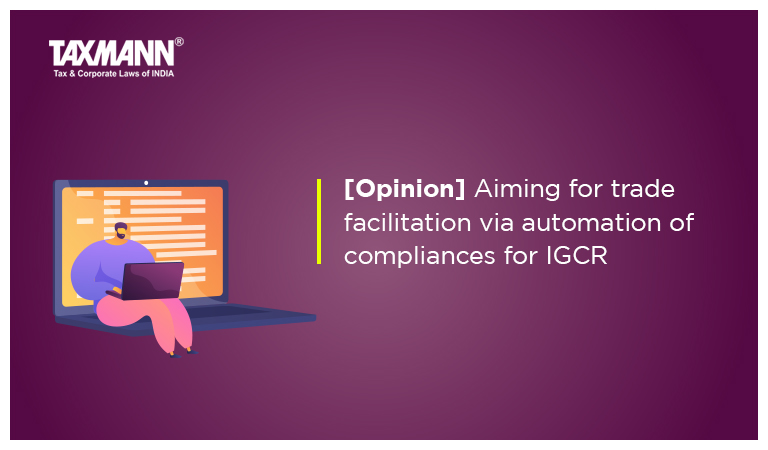[Opinion] Aiming for trade facilitation via automation of compliances for IGCR
- Blog|News|GST & Customs|
- 3 Min Read
- By Taxmann
- |
- Last Updated on 23 September, 2022

The Customs (Import of Goods at Concessional Rate of Duty-IGCR) Rules provide for procedural safeguards to ensure that goods imported at a concessional rate of duty, subject to an end-use condition, are used for the specified purpose. These rules are to be mandatorily complied with to avail the benefit of exemptions provided under various notifications. Industry players are willing to avail such benefit under the exemption notification, which is subject to compliance of IGCR rules. With an objective to attain a self-reliant and ‘Atmanirbhar Bharat’ and to boost domestic manufacturing, the Government of India has been taking various measures towards ‘trade facilitation’ and for ease of doing business. These measures will also help in realizing the goal of making India a globally competitive market. In Union Budget 2022, the government announced that IGCR compliances will be simplified and automated through a common portal from March 2022. The measures taken by the government under existing rules have broadly elaborated as under:
Changes effective from March 2022
Compliance through the portal
CBIC has taken significant steps in automating the compliances by providing various services through the online platform and by making several amendments to reduce the compliance burden of assessee(s). In light of the same, the procedures for Customs (IGCR) were simplified and made paperless and contactless with end-to-end automation. The following facilities were made available to importers from March 2022:
-
- One-time prior intimation on common portal to avail benefit under IGCR (The individual transaction-based permissions and intimations are all done away with thereby reducing manual intervention)
- Separate unique IGCR Identification Number (IIN) provided to the assessee which is required to be mentioned on bills of entry while availing the benefit under IGCR. All details in relation to the said IIN would be visible to jurisdictional Customs authorities through common portal
- Furnishing the continuity bond/surety on common portal which can be topped up periodically
- Maintaining all records on common portal on import of goods/sending goods for job work/inter unit transfer/re-export of goods
- For effective monitoring of use of goods for intended purpose, a monthly statement has been introduced (earlier the importer needed to undertake quarterly compliance)
Despite the above, the online portal is still not able to help companies undertake IGCR compliances in an automated manner due to the following key issues:
– In case of any incomplete data transmission on the IGCR common portal, the importer is not able to correct/amend the said information
– The duty forgone details are also incorrectly mapped
– Mapping of consumption data does not yet consider opening quantity of past imports
– Jurisdictional authorities still insist on manual submissions
The government needs to proactively address the challenges/issues faced by industries to smoothen the process for online filing of compliances.
Inter unit transfer of goods
The government included a specific provision to allow inter unit transfer of goods based on the representation made by various industries and trade associations.
Depreciation benefit that will be given on sale/disposal of capital goods imported under the IGCR Rules
An incentive provided to the importer to use capital goods and to clear the same in the domestic market at a depreciated value. The said change was not available before February 2021.
In addition to the above, the new IGCR Rules 2022 was notified vide Notification no. 74/2022-Customs (non-tariff) dated 09 September 2022, wherein some changes have been made to address long pending demands of trade and industry.
Click Here To Read The Full Article
Disclaimer: The content/information published on the website is only for general information of the user and shall not be construed as legal advice. While the Taxmann has exercised reasonable efforts to ensure the veracity of information/content published, Taxmann shall be under no liability in any manner whatsoever for incorrect information, if any.

Taxmann Publications has a dedicated in-house Research & Editorial Team. This team consists of a team of Chartered Accountants, Company Secretaries, and Lawyers. This team works under the guidance and supervision of editor-in-chief Mr Rakesh Bhargava.
The Research and Editorial Team is responsible for developing reliable and accurate content for the readers. The team follows the six-sigma approach to achieve the benchmark of zero error in its publications and research platforms. The team ensures that the following publication guidelines are thoroughly followed while developing the content:
- The statutory material is obtained only from the authorized and reliable sources
- All the latest developments in the judicial and legislative fields are covered
- Prepare the analytical write-ups on current, controversial, and important issues to help the readers to understand the concept and its implications
- Every content published by Taxmann is complete, accurate and lucid
- All evidence-based statements are supported with proper reference to Section, Circular No., Notification No. or citations
- The golden rules of grammar, style and consistency are thoroughly followed
- Font and size that’s easy to read and remain consistent across all imprint and digital publications are applied



 CA | CS | CMA
CA | CS | CMA
